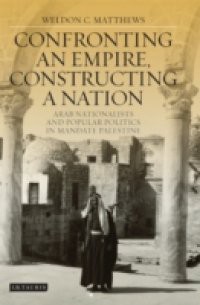Palestinian Arab nationalism is often portrayed as an elite ideology that did not gain popular appeal until after 1948. In this groundbreaking book, Weldon C. Matthews reexamines the rise of nationalism in Palestinian politics, using a wide range of sources. He finds that the new generation of Arab nationalists which emerged in the 1920s sought to construct an inclusive public sphere around the idea of the nation. Through schools, athletic clubs, newspapers and public rallies, the nationalists took their vision to the grassroots of Palestinian society._x000D_Advocating a nationalist identity, Matthews argues, was inextricably interlinked with resistance to British imperialism. The British sought to promote factionalism and sectarianism, and embracing an inclusive nationalist ideology was a powerful way of asserting independence. Matthews shows how the symbols of nationalist identity became potent weapons in a power struggle between British officials, Palestinian politicians, and nationalist activists throughout the Mandate period. Matthews's original and incisive book provides the reader with a deeper understanding of Palestinian political development and a more nuanced conception of the phenomenon of nationalism._x000D__x000D_

